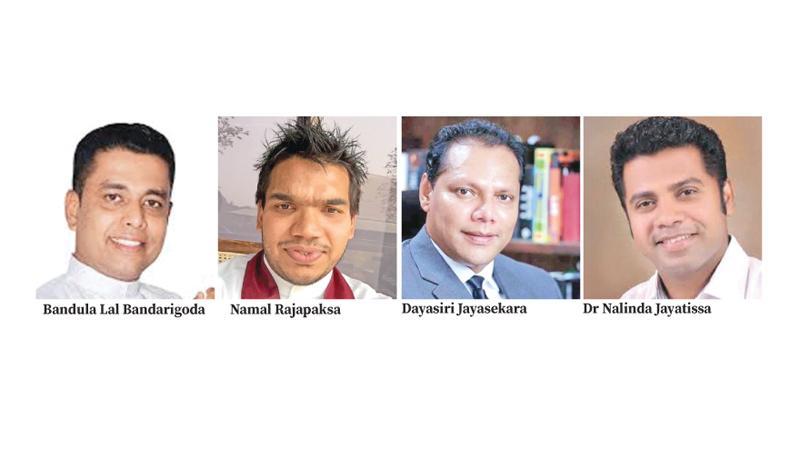
Hours before the Supreme Court issued a stay order on executions, two United National Party backbenchers launched moves in Parliament to repeal the death penalty in Sri Lanka’s statute books, in a bid to end the debate on capital punishment once and for all.
The Bill to abolish the death penalty, sponsored by UNP Galle District Parliamentarian Bandula Lal Bandarigoda and Gampaha District MP Kavinda Jayawardane was handed over to the Secretary General of Parliament. The Bill will be treated as a Private Member’s Bill, which could take up to six months to enact into law.
Addressing the media after handing over the Bill, Bandarigoda said he had requested the Secretary General to give priority to the matter and include the draft legislation in the Order Paper as soon as possible.
The proposed Bill of the MP states “the reference in any law to the imposition of the death penalty or punishment by death, shall, from and after the coming into force of this Act, be construed as punishment by imprisonment for life.
The Transitional Provisions 3 (a) of the Act says “any person in respect of whom a sentence of death has been imposed prior to the coming into force of this Act, shall be deemed to be a person sentenced to imprisonment for life in respect of such offence.” Transitional Provisions (b) has proposed “ any person who has committed, prior to the coming into force of this Act, an offence punishable with death, but in respect of whom a sentence of punishment has not yet been imposed by court, shall be deemed to have committed an offence punishable with imprisonment for life.”
MP Bandarigoda said some had already opposed the move to abolish the death penalty, claiming it was an attempt to defend convicts. “As a religious leader, the Buddha rejected killing. The imposition of the death penalty is a case of granting legal permission to kill somebody. As a Buddhist, I cannot agree to the carrying out of the death penalty,” he told a press briefing in the Parliamentary complex last week.
He said Prime Minister D.S. Senanayake had presented a motion in Parliament against the death penalty and in 1956 Prime Minister S.W.R.D. Bandaranaike took the decision to suspend the death penalty. Unfortunately, after the Bandaranaike assassination, the death penalty was reintroduced. Since 1976, the death penalty has never been enforced in the country, after Sri Lanka’s first executive president J.R. Jayewardene issued a moratorium on judicial hangings, saying the State could not end a person’s life in a righteous society. At present, Bandarigoda said, that the death penalty was only in effect in 56 countries worldwide but there was no data to prove that crime rates were lower in such countries.
The decision to execute was all the more dangerous in a country where the criminal justice system was deeply flawed, as in Sri Lanka, the UNP MP explained. It is unclear if the Bill sponsored by the two UNP backbench MPs will garner wide support in the legislature.
The UNP has already officially communicated that it was standing against the resumption of executions and was opposed to capital punishment.
“There is no success story in the world that shows the death penalty has been effective in preventing crime,” Hambantota District MP Namal Rajapaksa told Sunday Observer.
He and his father, former President Mahinda Rajapaksa were morally opposed to the death penalty, but politically, they had to hold discussions with their allies to reach a decision on whether to support the private member’s Bill. “Personally we don’t believe in it. It might be popular in the short term, but it has repercussions on society in the long term. Whatever decision we take won’t be based on short term results,” the young Parliamentarian added.
During his time spent in remand, he had encountered several inmates who had been wrongfully accused, Rajapaksa explained. “Some people are paid Rs 100,000 per month to do the jail time on someone else’s behalf,” he said. The JVP said they were opposed to resuming executions in the country based on two reasons. The first is because the party does not believe the crime rate in the country would decrease as a result of resuming hangings, said JVP Lawmaker Dr Nalinda Jayatissa. The JVP at their Tuesday’s group meeting will discuss about the Private Member’s Bill. “People who enjoy power escape the law easily, that is why the crime rate increases. Instead of imposing the death penalty, the aim should be to improve the efficiency of the police, Attorney General and the judiciary, to give effect to existing laws without delay,” he said.
Secondly, Dr Jayatissa said that countries worldwide had abolished the practice of capital punishment because innocent people had been put to death after being wrongfully convicted. “Similarly in our country too many innocent people have been punished due to loopholes in the law,” he explained.
SLFP General Secretary MP Dayasiri Jayasekara said his party had taken the position that the death penalty should be executed. He told Sunday Observer that the SLFP Central Committee had thanked the President for his decision to resume judicial executions in the country. “Earlier, the death penalty had been implemented during the regime of UNP leaders D.S. Senanayake, Dudley Senanayake and Sir John Kothalawala. The implementation of death penalty cannot be suspended by presenting Private Member motions,” Jayasekera claimed.
However, Bandarigoda has submitted a Private Members’ Bill, which is eligible for consideration by Parliament. Last week, the Illankai Tamil Arasu Kachchi (ITAK) the main constituent party in the Tamil National Alliance, passed a resolution at its party convention in Jaffna, opposing the death penalty. The party is likely to support moves to abolish the death penalty as a punishment in Sri Lanka’s code of criminal procedure.
